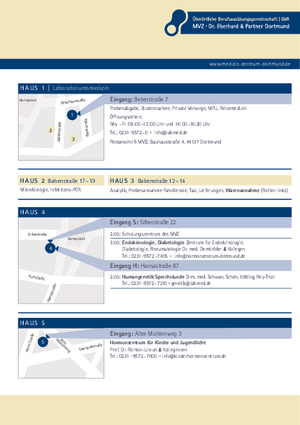Myeloid, myeloproliferative neoplasia, myelofibrosis prognostic panel MIPSS70 or MIPSS70 plus extended, NGS panel
Myelofibrose, Prognose 2 erweiterte MIPSS70 Score und andere Loci, NGS-PanelGensymbole
ASXL1 (E12), CALR (E9), CBL (E8,9), EZH2, IDH1 (E4), IDH2 (E4), JAK2 (E12-16), MPL (E4-12), RUNX1, SRSF2 (E1), U2AF1 (E2,6)
Siehe auch Tabelle Gen-Chromosom-Transkript-IDs des myeloischen Gesamtpanels.
Material
EDTA-Blut oder KM (EDTA bevorzugt): 1-2 ml
Methode
NGS
Kostenhinweis
EBM-Abrechnung möglich.
Indication
Prognostische Markersuche bei histologisch gesicherter primärer oder sekundärer (z.B. post PV) Myelofibrose. CALR Status (Typ I [–like] Mutation?) und Anzahl Mutationen in ASXL1, EZH1, IDH1, IDH2, SRSF2 von prognostischer Relevanz, vgl. „MIPSS70“ und „MIPSS70 plus“ Score. Für MF ist eine prognostische Einschätzung zu evtl. Transplantation mittels MIPSS70 Index möglich (oder auch „MIPSS70 plus“ Index, inklusive Zytogenetik. Im MIPSS70 Index ab 2 Scorepunkten intermediäres Risiko, ab 5 hohes Risiko. Zur Vervollständigung des MIPSS70 Index erforderlich: Hb, Leukozyten, Thrombozyten, Blastenzahl im pB, konstitutionelle Symptome, Fibrosegrad, CALRTyp1-Status (hier unklar, ob Typ I Mutation). Zur Berechnung online vgl. http://mipss70score.it MIPSS70“ Score 0-1 „LOW“, 2-4 „INTERMEDIATE“, ab 5 „HIGH“; MIPSS70 plus: Score 0-2= “LOW”, 3=”INT”, 4-6=”HIGH”, >7= “VERY HIGH” mit 5-Jahresüberleben zwischen 7% (“very high”) und 91% („low“). Entscheidungshilfe pro/contra Transplantationen. Neben MIPSS70 auch Status von U2AF1 (Anämie!, Imetelstat) von Bedeutung.
Note
Literatur:
- Tefferi und Barbui Am J Hematol. 2017 Jan;92(1):94-108. doi: 10.1002/ajh.24607.
- Tefferi A et al. Revised cytogenetic risk stratification in primary myelofibrosis. 2017; under submission.
- Zytogenetische “high risk” score-Punkte wenn: “Indicates any abnormal karyotype other than normal karyotype or sole abnormalities of 20q-, 13q-, +9, chromosome 1 translocation/duplication, -Y or sex chromosome abnormality other than –Y”
- Barraco et al., Blood Cancer Journal (2016)6, e415; doi:10.1038/bcj.2016.22
- Tefferi Blood Cancer Journal (2017) 7:648
Contact person analyzes program
Dr. rer. nat. Thomas Haverkamp
Biologist Molecular Haemato-oncology, hereditary cancer syndromes- +49 231 9572-6617
- 0231 9572-86618
Contact

Laboratoriumsmedizin Dortmund
44137 Dortmund
| Zugang und Anmeldung Patientinnen / Patienten: | Abgabe Proben Einsender Fahrdienst, Lieferanten: |
|---|---|
| Betenstraße 7 | Balkenstr. 12-14 |
| Sprechzeiten Blutentnahme, Abgabe Proben durch Patienten, private Vorsorgemedizin, MPU, Reisemedizin | Materialannahme von Einsendern |
| Mo-Fr: 8:00-13:00 Uhr und 14:00-16:30 Uhr | Mo-Fr: 7.30 -17.00 Uhr |
GFLiD Dispatch material and distribution
- +49 2306 94096-80
- +49 2306 94096-83
- http://www.gflid.de/
GFLiD Dispatch material, distribution, transport
Andreas Orwat
- +49 2306 94096-60
- +49 2306 94096-63
- http://www.gflid.de/
